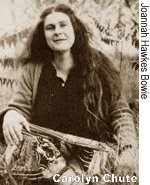| Verb Tense Consistency |
![[Logo]](../images/grammar.gif)
|
| Verb Tense Consistency |
![[Logo]](../images/grammar.gif)
|
Directions: The following paragraphs (in blue font) are taken from Carolyn Chute's novel The Beans of Egypt, Maine. Chute's novel maintains a striking immediacy through her unusual and consistent use of the present tense; things happen in a kind of perpetual now. When you click "The Beans" button below, the text will reappear in the text area. Select the present tense verbs (by double-clicking them) and change them into past tense verb, using ALL CAPS. Don't change tenses within quoted language and be careful not to change the form of verb forms that are not actually verbs. The second text area will reveal our version of this exercise when you click on "Grammar's Version."
When you've finished changing all the verbs, consider how the text has changed. What have you lost (or gained) by changing the verbs? What verbs didn't you change, and why not?

He moves up the mountain like a packhorse, crunching many small sticks and branches underfoot. She rides on his shoulders like a child. She wears a child-sized summer dress, and her bare legs are almost lost in his beard. Her hair is almost a fluorescent yellow. She is still very bony, very white, very silent. She smells of her morning bath.
On the mountains are countless birches: gray, gold, and the white, some of the young ones bending from last winter's pitiless snows. There is not much shade here. Birds scream from all directions.
Earlene says, "I'm not like Roberta, you know."
Beal grunts over a stone wall and crashes through fern and over soggy ground. "I wish you were," he says.
Her throat tightens. She holds down a garbled scream.
They go into a dark pine grove and his boots hiss.
They can hear a brook. A dragonfly tests Earlene's hair, then veers away. Beal walks slowly toward the brook.
He carries her higher, higher, over a barbed wire. Her yellow hair attracts another dragonfly. This one buzzes in Earlene's ear. She swipes at it.
Beal wears his railroad cap, his dark sunglasses. She feels the packhorse muscles of his shoulders and neck working, and his arteries beat against her legs.
"I HATE Roberta," Earlene almost sobs. "Daddy says it's just a mattera time before the health department shuts her down."
He is silent. When he comes to the brook, he crosses on round, flat stones. He stops and looks up at the trees, at their autumnal mauve. He stands stock-still except for his hands, which stroke Earlene's ankles, prod the hardness of her nails. Then he turns.
Below are the tiny rooves, a tatter of field, the broad violet hills, here and there a ruffled pond. He stands and stands and stands, a shoulder muscle quivering now and then, his bearing unfriendly, packhorse silent.
Carolyn Chute. The Beans of Egypt, Maine. Ticknor & Fields, New York, 1985. 149-150.
Consistency